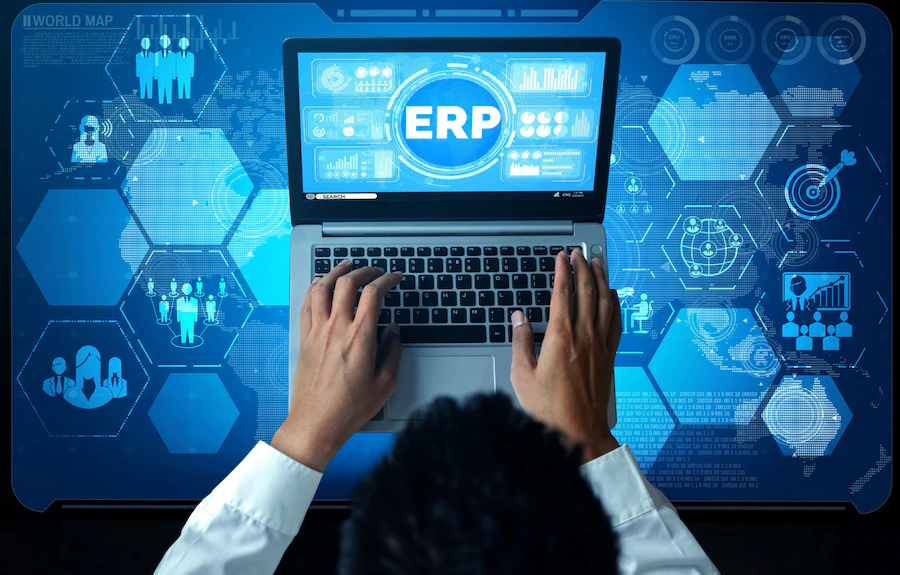The Power Of ERP Solutions: Transforming Industries And Boosting Business Performance
4 Mins Read
Published on: 08 July 2023
Last Updated on: 14 October 2024

toc impalement
Enterprise Resource Planning (ERP) solutions have revolutionized the way businesses operate by integrating and streamlining various aspects of their operations. In this article, we will explore the significance of ERP solutions, focusing on their application in the beverage industry. We will delve into the industries that utilize ERP software and highlight the numerous benefits it offers to businesses. From improved efficiency and cost savings to enhanced decision-making capabilities, ERP solutions have become indispensable tools for companies seeking growth and competitive advantage.
I. Understanding ERP Solutions
ERP solutions are comprehensive software systems designed to integrate and manage core business processes across various departments within an organization. These processes typically include finance, human resources, supply chain management, inventory, sales, and customer relationship management. By centralizing data and automating workflows, ERP systems facilitate seamless communication and collaboration among different departments, leading to improved operational efficiency.
II. Industries Utilizing ERP Solutions

Beverage Industry: The beverage industry, which encompasses sectors like breweries, wineries, distilleries, and soft drink manufacturers, greatly benefits from ERP solutions. These software systems enable efficient management of critical processes such as production planning, inventory control, quality management, and supply chain optimization. Beverage industry software tailored for ERP solutions helps organizations streamline their manufacturing operations, track raw material usage, manage recipe formulations, monitor quality assurance protocols, and ensure compliance with regulations.
Manufacturing: ERP solutions are widely employed in manufacturing industries across various sectors, including automotive, electronics, pharmaceuticals, and consumer goods. By integrating different functions such as production planning, inventory control, and shop floor management, ERP systems enhance production efficiency, minimize downtime, optimize resource allocation, and improve overall product quality.
Retail and Wholesale: The retail and wholesale sectors heavily rely on ERP solutions to effectively manage their complex supply chains, inventory control, and customer relations. These systems provide real-time visibility into stock levels, automate procurement processes, streamline order fulfillment, and enable seamless multichannel sales management.
Healthcare: In the healthcare industry, ERP solutions aid in consolidating patient information, managing medical inventory, optimizing resource allocation, and enhancing financial management. Hospitals and healthcare organizations utilize ERP systems to improve patient care, track medical supplies, streamline billing processes, and comply with regulatory requirements.
Iii. Benefits Of Erp Solutions For Businesses
Enhanced Efficiency and Productivity: By automating repetitive tasks, eliminating manual data entry, and providing real-time access to information, ERP solutions significantly boost operational efficiency and productivity. Streamlined workflows and improved collaboration across departments reduce bottlenecks, minimize errors, and accelerate business processes.
Cost Savings: ERP systems help businesses identify cost-saving opportunities through optimized inventory management, reduced lead times, and enhanced procurement processes. By providing insights into resource utilization and performance, organizations can identify areas of inefficiency and implement corrective measures, resulting in substantial cost savings.
Data Centralization and Accessibility: One of the primary advantages of ERP solutions is the centralization of data from various departments and functions into a single, unified system. This allows for easy access to accurate, up-to-date information, facilitating informed decision-making at all levels of the organization. Real-time reporting and analytics capabilities enable businesses to identify trends, make data-driven decisions, and respond swiftly to market changes.
Improved Customer Relationship Management: ERP solutions enable businesses to enhance customer relationship management (CRM) by providing a comprehensive view of customer interactions, purchase history, and preferences. With integrated CRM modules, organizations can personalize customer experiences, improve service quality, and implement targeted marketing campaigns, leading to increased customer satisfaction and loyalty.
Regulatory Compliance: In industries such as food and beverage, healthcare, and pharmaceuticals, compliance with stringent regulations is crucial. ERP solutions assist businesses in adhering to industry-specific regulations by enforcing standard processes, ensuring product quality and safety, and maintaining detailed audit trails.
Scalability and Flexibility: As businesses grow and evolve, ERP solutions offer scalability and flexibility to adapt to changing needs. These systems can accommodate an increasing volume of data, users, and transactions, supporting organizational expansion without significant disruption. Additionally, ERP solutions can be customized and configured to meet industry-specific requirements, ensuring a tailored fit for businesses operating in diverse sectors.
Competitive Advantage: Implementing an ERP solution can provide a competitive edge by optimizing operations, reducing costs, and improving customer satisfaction. The ability to make informed decisions based on real-time data allows businesses to respond swiftly to market demands, outperform competitors, and seize growth opportunities.
Conclusion
ERP solutions have emerged as indispensable tools for businesses across various industries, including the beverage industry. By integrating and automating key business processes, ERP software enables organizations to enhance operational efficiency, reduce costs, and make informed decisions. Whether in manufacturing, retail, healthcare, or other sectors, implementing an ERP solution offers significant benefits such as streamlined operations, improved customer relationship management, regulatory compliance, and scalability. Embracing ERP solutions empowers businesses to stay competitive in a rapidly evolving marketplace and achieve sustainable growth.
Read Also:


















Comments Are Closed For This Article